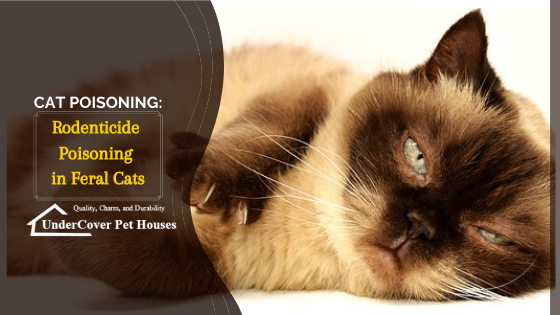 Loading... Please wait...
Loading... Please wait...Blog - Feral Cat Poisoning
Cat Poisoning: Rodenticide Poisoning in Feral Cats
Posted by Danny MacDonald on 2020 Sep 17th

If there's one thing about rats and mice, they're embarrassing and a huge nuisance. Often, when looking to tackle the rodent infestation menace, homeowners turn to rodenticides.
On paper, rodenticides seem like a viable option to easily get rid of rats and mice. However, unbeknown to most homeowners, rodenticides pose a significant risk to our pets, especially our adorable kitties.
And given their curiosity, not to mention their instinctive nature to hunt rodents, your cat's safety should be a key concern. More so, outdoor cats face a higher risk, given their exposure to rodenticides and poisoned prey.
Here, we take a look at rodenticide poisoning in cats, ways to spot it, take action, and prevent its occurrence.
How Do Rodenticides Work?
Commonly, rodenticides work by triggering internal bleeding once ingested. Nevertheless, not all rodenticides do this. Depending on the type, rodenticides contain a varied ingredients that affect how they work. Some rodenticides contain elements that can cause kidney failure, brain inflammation, muscle failure, or phosphine gas in the stomach.
How Can Your Feral Cat Get Poisoned by Rodenticides?
Since rodenticides are commonly used around homes, cats can become the first victim to such enticing bait. In such cases, a cat will directly ingest the rodenticide and get poisoned.
Additionally, given their remarkable hunting instincts and their love for the great outdoors, cats can fall victim to secondary rodenticide poisoning. While roaming the outdoors, they may hunt down and consume a rodent that may have recently consumed poisoned bait. Notably, rodents don't instantly die when they consume poisoned bait. As such, they can wander around and, in the process, cross paths with your instinctive feline who will catch, kill, and ingest them. Consequently, such a scenario poses a great danger for feral cats since the poison will equally affect their health.
Tip: Knowing what type of rodenticide poisoned your cat can help your vet administer more effective medical care.
Signs of Rodenticide Poisoning in Cats
Should your feline fall victim to rodenticide poisoning, they will likely present some of the common signs listed below. However, such signs may vary depending on the type of active poison used in manufacturing the rodenticide.
- Hemorrhage
- Blood accumulation in the chest or abdomen
- Dyspnea or rapid breathing
- Poor pulses
- Pale gums
- Bruising
- Lethargy and Weakness
- Staggering/Lameness
- Vomiting blood
- Seizures
- Joints swelling
If you suspect or ascertain that your cat has ingested rodenticide, seek immediate medical attention from the nearest vet or contact Animal Poison Control. Remember that fast, aggressive care might be a deciding factor in whether or not your cat survives the ordeal or not.
Tips to Help You Protect Your Cat from Rodenticides
- Let your cat do what they know best — your cat is a natural-born hunter who will not hesitate to hunt down and kill any rodents in your home
- Keep your outdoor cat in a containment area where they are away from any poison you are using
- Only use cat-safe rodent control options
- Only work with exterminators who use pet-safe rodent control methods
- Request that your neighbors not leave any rodenticides in their yard. if they
- plan to, request them to notify you in advance
- Enquire about rodenticides within nearby parks or your neighborhood.
Undoubtedly, rodenticides are non-selective of their victims. They can affect on mice, rats, cats, dogs, and humans alike. That said, should you use any rodenticides, only use pet-safe rodenticides and do so with extreme care. Besides, take the necessary steps highlighted above to keep your feline safe from rodenticides' powerful effects. Should your kitty unknowingly fall victim to rodenticide poisoning, ensure you seek immediate medical attention from the nearest vet.
